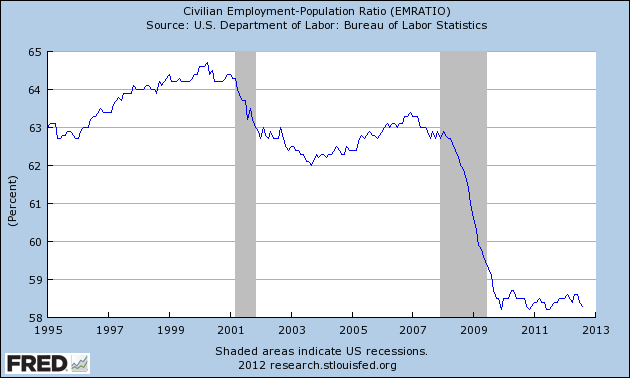Listening
Gold Member
- Aug 27, 2011
- 14,989
- 1,650
- 260
lol you cons cling to this stat when you have nothing else. News flash: the labor participation rate has been declining before Obama came to office and two of the primary reasons why it has been declining is retirement and disability claims.This is why:So...a few hundred thousand a month isn't enough? Why not?Hmm well we have had consistent job growth each month since the stimulus came into effect. HmmmmI've challenged Board liberals repeatedly to tell us all what Barack Obama's plans are to create jobs and stimulate the economy and the only answer that ever seems to come back is that "you can't make plans if you know the other side won't let you do them!" I'm sorry folks but that's a cop out! You CAN make plans and you CAN present them to the American people and let THEM pressure Congress into acting! Barry doesn't DO that because Barry hasn't had an economic stimulus plan since the Obama Stimulus tanked WAY back in the beginning of his first term. Since then he hasn't even tried. I'll bet you can't even tell me who his economic advisers ARE...can you? Think about that! The number one concern for Americans in poll after poll for six years has been jobs and the economy and yet you don't know who Barry's economic "gurus" are!
Jesus, Billy...are you kidding? It's been the worst recovery from a recession since the Great Depression! Job growth has been grinding along for years now. I guess you could call that "consistent" growth but consistently sluggish is not something to brag about!
So...did you want to tell me who Barry's economic advisers are? And then give us a brief synopsis of what their plan is to put people back to work? Or are you going to keep on ducking?

How and anyone look at that graph and make such a stupid statement. Even a two-year old could see the huge drop shown on the graph. The claim that it is retirement is stupid. People began putting OFF retirement after the crash because they could not afford Obama. The rate then levels out even though we are just starting to hit the time when boomers are supposed to start (and are) retiring in droves.
You are a cretin.

